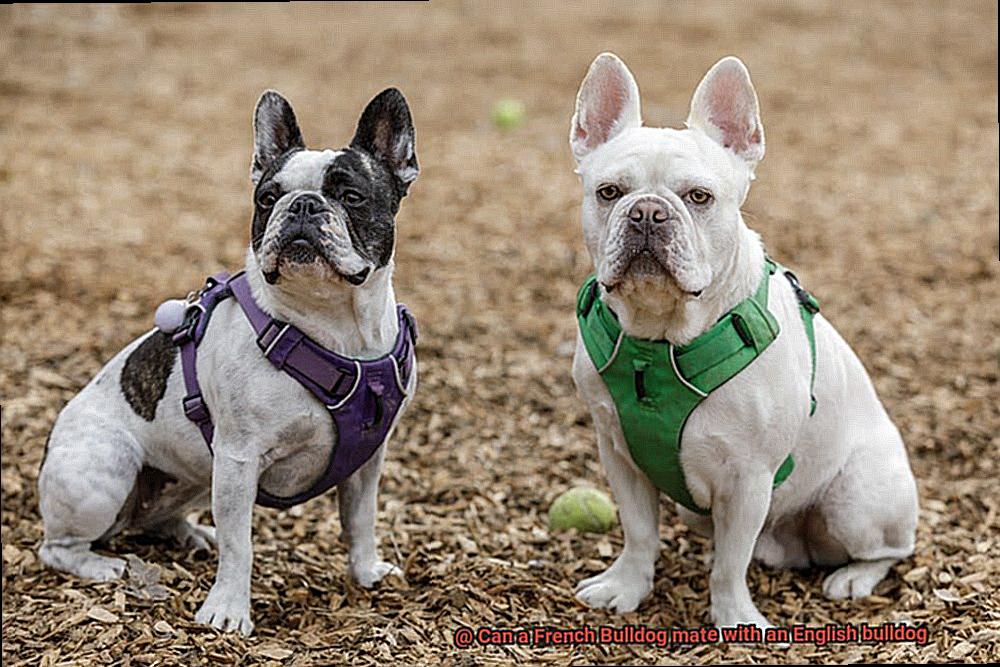Can a French Bulldog mate with an English bulldog?
Bulldogs are like the rockstars of the dog world – they’ve got that unmistakable swagger, a face you can’t resist, and a heart full of love. And when it comes to bulldogs, the French Bulldog and the English Bulldog are two of the biggest stars. But here’s the burning question on everyone’s mind: can these two breeds actually make babies together?
In this blog post, we’re diving deep into the world of bulldog romance. We’ll explore what makes Frenchies and English Bulldogs unique, what challenges they face in the mating game, and all the important things breeders and dog enthusiasts need to know.

Can a French Bulldog mate with an English bulldog?
Contents
- 1 Can a French Bulldog mate with an English bulldog?
- 2 Physical and Genetic Differences Between French Bulldogs and English Bulldogs
- 3 Can a French Bulldog Mate with an English Bulldog?
- 4 Challenges of Natural Mating Between Different Breeds
- 5 Artificial Insemination for Breeding Different Breeds
- 6 Responsible Breeding Practices for French Bulldogs and English Bulldogs
- 7 Health Screenings Before Mating French Bulldogs and English Bulldogs
- 8 Potential Genetic Health Issues in Offspring from Crossbreeding
- 9 Consulting a Veterinarian or Dog Breeder Before Attempting to Breed
- 10 Conclusion
Spotting the Differences: Frenchies vs. English Bulldogs
French Bulldogs and English Bulldogs may be part of the same family tree, but they’ve got their own distinct styles. Frenchies are like little muscle-packed nuggets with cute bat ears, a snub nose that begs for boops, and a sleek coat that’s just too cool for school. They’re playful social butterflies that fit right into any family.

English Bulldogs, on the other hand, are big ol’ teddy bears with broad heads, wrinkly faces made for smooching, and an underbite that gives them extra charm points. They’re known for their calm nature and unwavering loyalty – truly gentle giants.
The Challenges of Crossbreeding
Now let’s talk about mixing these two adorable breeds together. While it’s physically possible for Frenchies and English Bulldogs to get busy between the sheets (or should I say between the paws?), there are some hurdles to overcome. The main challenge lies in their different body shapes – Frenchies are compact while English Bulldogs have more meat on their bones. This can make natural reproduction a bit trickier.
And let’s not forget about the ladies. Frenchies might struggle with giving birth naturally due to their narrow hips, while English Bulldogs can face difficulties because of their big noggins and broad shoulders. It’s like a Bulldog puzzle that needs careful consideration.
Ethical and Health Considerations
Now, we’ve got to talk about the potential health issues for these mixed breed babies. Both French Bulldogs and English Bulldogs have their fair share of health problems, like breathing issues, wonky hips, and eye troubles. Crossbreeding could potentially amplify these problems
Physical and Genetic Differences Between French Bulldogs and English Bulldogs
While they may share some similarities in appearance, there are significant physical and genetic differences that set them apart. In this article, we will explore these distinctions, shedding light on what makes each breed unique.
Physical Differences:
Size:
French Bulldogs are known for their compact size, weighing between 16-28 pounds and standing around 11-12 inches tall. On the other hand, English Bulldogs are larger, tipping the scales at 40-50 pounds and standing around 14-15 inches tall. It’s like comparing a petite ballerina to a burly wrestler.
Facial Structure:
The most recognizable difference between these breeds lies in their facial structure. French Bulldogs boast a “smushed” face with a more pronounced muzzle, while English Bulldogs have a larger head with a shorter, wider muzzle. It’s as if the French Bulldog is the cute kid with chubby cheeks, while the English Bulldog is the wise old soul with a strong jawline.
Body Structure:
French Bulldogs have a more athletic build, resembling a miniature athlete ready to sprint across a field. In contrast, English Bulldogs have a stockier and more muscular appearance, giving them an air of strength and power.
Genetic Differences:
DM Gene Mutation:
French Bulldogs carry a specific gene mutation called the DM gene, which can lead to degenerative myelopathy—a progressive spinal cord disease affecting mobility. Responsible breeders screen for this mutation to ensure the health of the breed.
Health Issues:
English Bulldogs have a unique breeding history that makes them prone to certain health issues such as hip dysplasia, respiratory problems, skin allergies, and eye disorders. Health tests on parent dogs are essential to minimize genetic conditions passed on to offspring.
Mating Between French Bulldogs and English Bulldogs:

While it is technically possible for these breeds to mate, it is generally not recommended due to potential complications and health risks. The size difference alone can make natural mating challenging, and the differences in facial structure may cause breathing problems during the breeding process. Moreover, crossbreeding could increase the risk of passing on genetic health issues to offspring. Responsible breeders prioritize the health and well-being of their dogs and typically avoid crossbreeding between these two breeds.
French Bulldogs and English Bulldogs may share some physical characteristics, but their differences are significant. From their size and facial structure to their genetic profiles, each breed possesses distinct qualities that make them special.
Understanding these differences is crucial when considering breeding and caring for these wonderful canine companions. Remember, responsible breeding practices and prioritizing the health of dogs should always be at the forefront of any decision-making process.
Can a French Bulldog Mate with an English Bulldog?
Picture this: a French Bulldog with its adorable bat ears and a wrinkly English Bulldog with its distinctive underbite. They may seem like a perfect couple, but can these two breeds actually mate? Let’s take a closer look at the challenges and potential health risks associated with breeding a French Bulldog with an English Bulldog.
Size Matters
One of the first obstacles to consider is the size difference between these two breeds. French Bulldogs are generally smaller and lighter compared to their English Bulldog counterparts. This size disparity can make it difficult, if not impossible, for successful natural mating to occur. The physical act of mating requires proper alignment and coordination, which can be challenging when there is a significant size difference.
Body Structure and Anatomy
In addition to size, the body structure and anatomy of these breeds also present challenges. French Bulldogs have a more compact body and a narrower pelvis compared to English Bulldogs. These physical differences can make it even more difficult for natural mating to take place. The narrow pelvis of the French Bulldog may not be compatible with the larger size of an English Bulldog male, making it necessary to explore alternative breeding methods.
Artificial Insemination
To overcome the challenges of natural mating, artificial insemination may be required. This involves collecting sperm from the male dog and inserting it into the female’s reproductive tract using specialized techniques. While artificial insemination can increase the chances of successful breeding between these two breeds, it is still important to consult with a veterinarian or professional breeder who has experience with both French Bulldogs and English Bulldogs.
Potential Health Risks
Breeding between French Bulldogs and English Bulldogs can also pose potential health risks. Both breeds are prone to certain genetic health issues, such as brachycephalic syndrome and respiratory problems. By breeding them together, there is an increased risk of passing on these genetic conditions to the offspring. It is crucial to prioritize the health and welfare of the parent dogs and any potential puppies when considering breeding between these two breeds.
Consult the Experts

If you are considering breeding a French Bulldog with an English Bulldog, it is always recommended to consult with a veterinarian or a professional breeder who has experience with both breeds. They can provide guidance, advice, and ensure that all necessary precautions are taken to ensure the health and well-being of the dogs involved.
Challenges of Natural Mating Between Different Breeds
Picture this: a French Bulldog named Pierre and an English Bulldog named Winston. They say opposites attract, but when it comes to natural mating between different breeds, there are some challenges to consider. In this blog post, we’ll explore the obstacles that can arise when these two adorable breeds try to create a love connection.
Size Matters:
Small Dog, Big Bulldog
French Bulldogs are petite and compact, while English Bulldogs are larger and heavier. This size difference can make natural mating a challenge, as the male may struggle to mount the female properly. It’s like trying to fit a round peg in a square hole – not an easy task.
Mating Behaviors:
The Dance of Love
Each breed has its own unique mating behaviors and instincts. If these behaviors do not align or are incompatible, successful mating becomes unlikely. When it comes to the French Bulldog and English Bulldog, their reproductive dances may not always be in sync. So, even if they’re both ready to tango, it might be difficult for them to find the right rhythm.
Fertility Rates:
Let’s Talk about Baby Bulldogs
Breeds can have different fertility rates, which can affect their ability to successfully mate with individuals from other breeds. Some breeds may have higher or lower fertility rates, making the chances of conception uncertain. Additionally, certain breeds that have been heavily manipulated or bred for specific traits may face reproductive issues that make natural mating more challenging.
Canine Chemistry:
Love at First Sniff?
Dogs exhibit mate preference based on scent, appearance, and familiarity. Just like humans, they can have their own preferences when it comes to potential partners. If a French Bulldog and an English Bulldog don’t find each other attractive, it can reduce the likelihood of successful mating. Sometimes, love at first sniff just isn’t in the cards.
Health Considerations:
SMatters of the Heart…and Health
Breeding between different breeds may increase the risk of inherited genetic disorders or health issues being passed on to their offspring. With French Bulldogs and English Bulldogs, both breeds are prone to certain health conditions, such as brachycephalic syndrome and hip dysplasia. These risks should be carefully considered before attempting natural mating.
Artificial Insemination for Breeding Different Breeds
In the world of bulldog romance, a French Bulldog named Pierre and an English Bulldog named Winston face size differences, incompatible mating behaviors, uncertain fertility rates, canine chemistry challenges, and potential health risks when trying to create a love connection – proving that even in the doggie dating world, opposites don’t always attract. But fear not, fellow bulldog enthusiasts. With the help of artificial insemination (AI), these obstacles can be overcome, paving the way for successful breeding between different bulldog breeds.
Advantages of Artificial Insemination:
Overcoming Physical Limitations:
- French Bulldogs’ compact body structure and short stature can make natural breeding challenging.
- English Bulldogs’ large heads and broad chests can pose difficulties in natural mating.
- AI allows breeders to bypass these physical limitations and ensure successful breeding.
Genetic Diversity:
- By facilitating breeding between different bulldog breeds, AI helps maintain genetic diversity within the population.
- This can reduce the risk of inherited diseases and promote overall breed health.
Challenges of Artificial Insemination:
Success Rate Variability:
- Factors such as semen quality, timing of insemination, and female dog’s health can impact the success rate of AI.
- Working with a knowledgeable veterinarian or reproductive specialist is crucial for maximizing success.
Technical Proficiency:
- AI techniques such as transcervical insemination (TCI) and intrauterine insemination (IUI) require specialized training and expertise.
- It is essential to work with professionals who have experience in these procedures to ensure proper execution.
Responsible Breeding Practices for French Bulldogs and English Bulldogs
When it comes to breeding French Bulldogs and English Bulldogs, responsible practices are crucial to ensure the health and well-being of these beloved breeds. Here are some key considerations for breeders and pet owners alike.
Prioritize Health and Welfare
The health and welfare of the dogs should always be the top priority. Before breeding, both the French Bulldog and English Bulldog parents should undergo thorough health screenings and genetic testing to identify any potential health issues that could be passed on to their puppies. This can help reduce the risk of genetic diseases and promote healthier offspring.
Conformation and Temperament
Both breeds should have good overall conformation and temperament. This means selecting breeding pairs that exhibit desirable traits and conform to the breed standards. By doing so, breeders can increase the chances of producing puppies with similar traits.
Size Difference Challenges
Breeding French Bulldogs and English Bulldogs together can present challenges due to their size difference. Breeders should closely monitor the mating process and delivery to ensure the safety of both the male and female dogs. Assistance may be required during delivery to ensure a smooth process.
Understanding Breed Standards
Responsible breeders should have a thorough understanding of the breed standards for both French Bulldogs and English Bulldogs. This knowledge will help them select appropriate breeding pairs that will produce puppies that meet these standards.
Consider Demand
Breeders should consider the demand for French Bulldog and English Bulldog mixes before deciding to breed them together. While some people may be interested in these crossbred puppies, others may prefer purebred dogs. Responsible breeders should always have the best interest of their dogs in mind and not solely focus on profit or popularity.
Lifelong Support
Responsible breeders should be prepared to provide lifelong support and care for the puppies they produce. This includes ensuring they go to loving homes where they will receive proper care and attention. Breeders should also be available to answer any questions or provide guidance to new owners throughout the lifetime of the dog.
Health Screenings Before Mating French Bulldogs and English Bulldogs
Breeding French Bulldogs and English Bulldogs is a significant responsibility that requires careful consideration to ensure the health and well-being of the offspring. Both breeds are prone to certain genetic health issues, making it crucial to conduct thorough health screenings before mating. In this blog post, we will explore why health screenings are essential for these breeds and discuss the specific screenings recommended by experts.
Understanding the Genetic Health Issues:
French Bulldogs and English Bulldogs share some common genetic health issues, including brachycephalic airway syndrome, hip dysplasia, and various eye disorders. Additionally, English Bulldogs may experience skin allergies, heart problems, and a higher risk of heat stroke due to their compromised breathing ability.
Comprehensive Physical Examination:
Before breeding French Bulldogs or English Bulldogs, it is vital to have both dogs undergo a comprehensive physical examination by a veterinarian. This examination helps assess their overall health, body condition score, and any visible signs of health issues or abnormalities.
Specific Health Screenings:
To identify potential genetic conditions, specific health screenings should be performed. These screenings may include hip and elbow evaluations, eye examinations by a veterinary ophthalmologist, cardiac evaluations, and genetic testing for specific diseases.

Hip and Elbow Evaluations:
Hip and elbow evaluations assess the joints’ integrity and can detect conditions such as hip dysplasia or elbow dysplasia. These conditions significantly impact the quality of life for both the parents and their offspring.
Eye Examinations:
French Bulldogs and English Bulldogs are prone to various eye disorders. Eye examinations can detect conditions like cherry eye, cataracts, and entropion. Identifying these issues before breeding helps prevent them from being passed on to future generations.
Cardiac Evaluations:
Cardiac evaluations are crucial to assessing the heart health of both breeding dogs. They can detect underlying heart conditions or abnormalities that may be hereditary and passed on to the offspring.
Genetic Testing:
Genetic testing is a valuable tool in identifying potential hereditary diseases or conditions. These tests provide breeders with essential information about the genetic health of their dogs, enabling them to make informed breeding decisions.
Potential Genetic Health Issues in Offspring from Crossbreeding
Today, we’re going to dive into the fascinating world of crossbreeding French Bulldogs and English Bulldogs. While this may seem like a perfect pairing, it’s essential to be aware of the potential genetic health issues that can arise in their offspring. So, let’s uncover these concerns and equip ourselves with knowledge to ensure the well-being of our furry friends.
Brachycephalic Airway Syndrome:
Picture this: your Frenchie’s adorable snub-nosed face combined with the English Bulldog’s charming mug. However, this mix could intensify respiratory difficulties. Both breeds already face challenges due to their short snouts, which can result in breathing problems. But when bred together, these issues can become more severe, potentially leading to brachycephalic airway syndrome.
Spinal Abnormalities:
Imagine your crossbred pup zooming around the house with boundless energy. Sadly, spinal abnormalities can put a damper on their playtime. French Bulldogs are susceptible to intervertebral disc disease, while English Bulldogs may have spinal deformities like hemivertebrae. When combined through crossbreeding, the chances of spinal issues in the offspring increase.
Skin Problems:
We all want our pups to have flawless skin, but crossbreeding Frenchies and English Bulldogs might heighten their risk of dermatological woes. French Bulldogs are known for sensitive skin prone to allergies and dermatitis, while English Bulldogs often battle skin infections and fold dermatitis due to their wrinkled skin. This combination can lead to offspring more susceptible to various skin issues.
Eye Problems:
The eyes are the window to our bulldogs’ souls, and we want them bright and healthy. However, crossbreeding between French Bulldogs and English Bulldogs can heighten the chances of passing on eye disorders. Frenchies often suffer from cherry eye and corneal ulcers, while English Bulldogs are prone to entropion and dry eye. It’s crucial to be vigilant about their eye health when considering crossbreeding.
Reproductive Challenges:
Ah, the miracle of life. However, crossbreeding these breeds may complicate the natural reproduction process. Both French Bulldogs and English Bulldogs frequently require artificial insemination and cesarean sections for successful breeding and delivery. When combined, reproductive challenges could become more pronounced in the offspring, affecting their ability to reproduce naturally.
Consulting a Veterinarian or Dog Breeder Before Attempting to Breed
That’s why it is essential to consult with a veterinarian or a reputable dog breeder before attempting to breed these two breeds together.
The Importance of Consulting a Veterinarian:
Health Assessment:
- A veterinarian can perform health checks, including genetic testing, to identify any potential risks or hereditary diseases that may be passed on to the offspring.
- They can evaluate the overall physical condition of the dogs, ensuring they are in good health and capable of mating without complications.
- Proper nutrition, exercise, and pre-breeding care can be advised by a veterinarian to optimize the chances of successful mating.
The Role of a Dog Breeder:
Breed Compatibility:
- Dog breeders specialize in breeding specific breeds and can provide insights into the characteristics of both French Bulldogs and English Bulldogs.
- They can help determine if these breeds are compatible for mating based on temperament, structure, and genetic compatibility.
Selecting the Right Mate:
- A reputable dog breeder can assist in selecting the right mate for your dog, considering factors such as temperament, structure, and genetic traits.
- They can identify potential risks or challenges that may arise from breeding these two breeds together.
Breeding Process Guidance:
- Dog breeders can offer information on ideal timing for mating and provide guidance on pre-breeding care.
- They can guide you through whelping (giving birth) and postnatal care for the mother and puppies.
Responsible Breeding Practices:
- Both veterinarians and dog breeders prioritize the welfare of the dogs involved.
- They will only advise breeding if it is safe and beneficial for the health and well-being of both the parent dogs and potential offspring.
nqceps5MK-o” >
Conclusion
In conclusion, it is indeed possible for a French Bulldog to mate with an English Bulldog.
These two breeds share a common ancestry and have similar physical characteristics that allow for successful breeding. However, it is important to consider the potential health risks associated with such crossbreeding.
Therefore, it is crucial to consult with a veterinarian or a reputable breeder who can provide guidance on responsible breeding practices.




